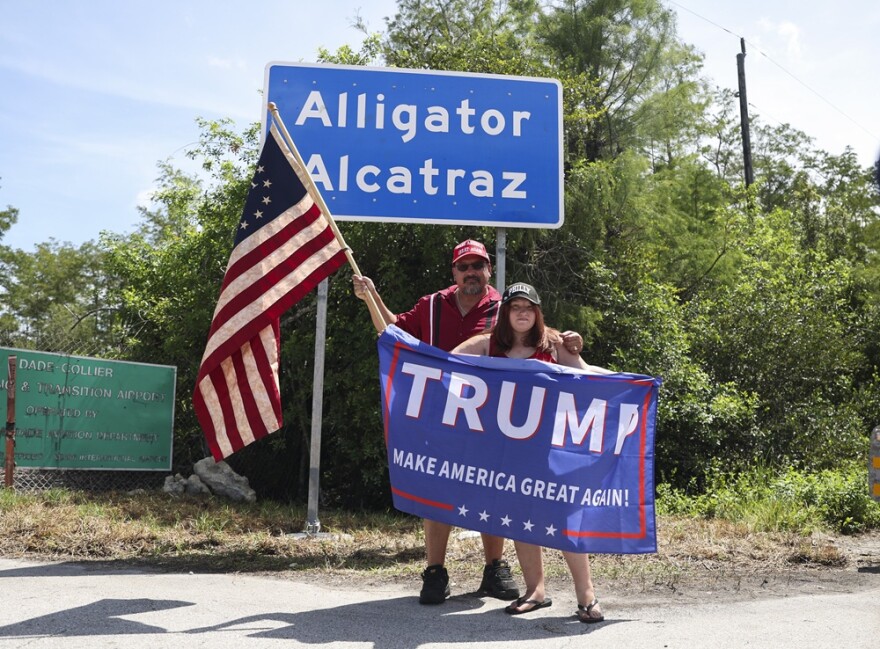Citing "significant concerns about environmental degradation" and threats to "traditional and religious ceremonies," members of the Miccosukee Tribe are trying to join a lawsuit challenging an immigrant-detention center in the Everglades.
The facility, dubbed "Alligator Alcatraz" by Gov. Ron DeSantis and other Republican leaders, neighbors 10 villages that are home to the Miccosukee Tribe of Indians of Florida in the Big Cypress National Preserve — including a village 1,000 feet away from one of the detention center's boundaries — as well as areas where tribal members work and attend school.
"The Miccosukee people have lived in and cared for the land now known as the Big Cypress National Preserve since time immemorial," lawyers for the tribe wrote Monday in a motion to join the lawsuit that environmental groups filed June 27 against state and federal officials.
Tribal members from throughout Florida travel to the preserve to "hunt, trap and hold sacred ceremonies," the court document said.
Lawyers for the tribe echoed legal arguments by Friends of the Everglades and the Center for Biological Diversity, which filed the lawsuit alleging that officials failed to comply with a federal law requiring that an environmental impact study be performed before developing the facility.
ALSO READ: PolitiFact FL: Experts say it's not possible to have no environmental impact at 'Alligator Alcatraz'
The detention compound, which was erected adjacent to an airstrip known as the Dade-Collier Training and Transition Airport is "surrounded on all sides by the preserve or lands perpetually leased" to the Miccosukees, the tribe's lawyers said in Monday's motion.
But Gov. Ron DeSantis has disputed that the facility threatens the environment, in part pointing to the decades-old airport, which is used for flight training.
The court document filed by the Tribe's lawyers included a historical overview of the tribe's treatment by settlers dating to the 1800s and addressed the detention center's impact on the tribe's "primordial connection to" and "longstanding stewardship of" the surrounding land.
The Miccosukees "continue to live in traditional villages within the preserve and routinely hunt, fish, trap, gather plants, hold sacred rituals, and lay their deceased to rest in the preserve," their lawyers wrote in Monday's document.
The detention center's "proximity to the tribe's villages, sacred and ceremonial sites, traditional hunting grounds, and other lands protected by the tribe raises significant concerns about environmental degradation and potential impacts to same caused by the construction and operation of a detention facility" at the site, the document said.
Members of the tribe also are concerned about "impacts to their freedom to hunt and fish in the immediate area adjacent to a securitized federal detention and immigration facility, as well as the possibility of a facility escape posing a security risk for their community," the filing said.
The Miccosukees' motion argued that the number of occupants at the facility — which state officials said will house up to 4,000 detainees and another 1,000 workers — will "at a minimum, more than double the residential density in the area," which is accessible by a two-lane highway, known as the Tamiami Trail, which stretches across the state.
"The construction and operation of a detention facility without necessary environmental studies potentially poses a substantial threat to the rights and interests of the tribe and the livelihood of tribal members who live adjacent thereto," the motion said.

Attorneys for the DeSantis administration have argued in the lawsuit that the National Environmental Policy Act, the federal law that requires evaluating potential environmental impacts before projects affecting sensitive areas can move forward, does not apply to the Everglades facility because it is being operated by the state.
Groups of state and federal lawmakers toured the facility on Saturday. Speaking to reporters after the visit, U.S. Rep. Maxwell Frost, D-Fla., called the conditions for detainees inhumane. Frost said that "cages" inside tent-like structures on the site each house 32 men, who share three toilets that are equipped on top with a dispenser used for drinking water.
"All in all, every Floridian should be ashamed of the fact that our taxpayer money is being used for this internment camp where people are in horrible conditions in hot Florida sun," Frost said. "It's a gross misuse of resources to dehumanize immigrants and dehumanize people who were all Latino men in this facility."
But Attorney General James Uthmeier, who was instrumental in selecting the site for the detention facility, disputed Democrats' criticisms.
"I don't know what they're doing. They were elected to serve American people yet they're crying and bending over backwards to fight for illegal aliens, many of whom are wanted for serious, serious crimes," Uthmeier told reporters Tuesday.
ALSO READ: Border czar Tom Homan says critics are wrong about poor conditions at 'Alligator Alcatraz'
The state has estimated it will cost roughly $450 million a year to operate the detention facility, and another facility is planned at North Florida's Camp Blanding, which is used by the Florida National Guard for training. DeSantis has said the money would be reimbursed by the Trump administration.
After the state dubbed the detention center "Alligator Alcatraz," Republican party officials are selling merchandise emblazoned with the moniker. President Donald Trump, U.S. Department of Homeland Security Secretary Kristi Noem and other state and federal officials toured the facility before detainees began to arrive this month. Noem has said she is in talks with five other GOP-led states to launch similar detention centers.
While DeSantis and others have extolled the Everglades center, information about its operation — which is being conducted through an agreement with the federal Immigration and Customs Enforcement agency — has been difficult to obtain from official sources.
After news reports identified contractors observed at the detention complex, vendors began obscuring the names of their companies on vehicles.
State Rep. Anna Eskamani, an Orlando Democrat who also toured the detention center on Saturday, released a copy of a purchase order Tuesday showing that the state Division of Emergency Management has agreed to pay Jacksonville-based Critical Response Strategies LLC $78.5 million for correctional services and "onsite transportation" at the facility.
Also, immigration attorneys and families of detainees have said they are having problems locating people at the facility, who may not appear on databases that are supposed to track detainees accused of being in the country illegally.
Katie Blankenship, an immigration attorney who has several clients at the Everglades center, said that information is often difficult to obtain about people being held at similar immigrant-detention centers.
"But this is an escalation we haven't seen before," Blankenship told The News Service of Florida in an interview, pointing to the Trump and DeSantis administrations' stance on immigration. "This is a perfect storm and sort of a sick mixture, a cocktail of state and federal action and working together this way has contributed to the confusion, intentionally."






